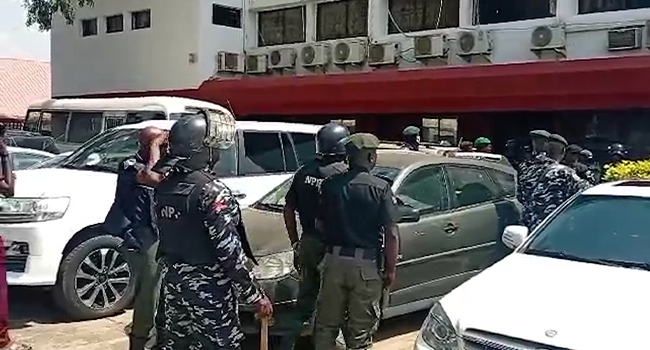Tension gripped the national headquarters of the Peoples Democratic Party (PDP) in Abuja on Monday as heavy security presence surrounded the building following the resumption of former North-Central Vice Chairman, Abdulrahman Mohammed, as the party’s acting national chairman.
Mohammed’s assumption of office comes amid a widening leadership crisis within the opposition party, with rival factions of the National Working Committee (NWC) announcing counter-suspensions of key officers over the weekend.
Earlier in the day, Mohammed and his supporters converged on the Federal Capital Territory office of the PDP, where he addressed party faithful, confirming his takeover as acting chairman. “I am resuming in line with the directive of the National Working Committee under the leadership of Senator Samuel Anyanwu,” he told supporters.
His emergence follows a declaration by the Samuel Anyanwu-led NWC, which appointed him acting national chairman after suspending the substantive chairman, Umar Damagum, and National Publicity Secretary, Debo Ologunagba.
The Anyanwu faction’s decision came in swift retaliation to Damagum’s earlier move to suspend Anyanwu himself, along with National Organising Secretary Umar Bature and several other principal officers. The tit-for-tat suspensions have effectively split the PDP’s top hierarchy into two opposing camps, each claiming legitimacy.
As Mohammed arrived at the PDP national secretariat to formally assume duty, armed security personnel from the police and civil defence were stationed at strategic points within and around the complex to prevent any breakdown of order.
READ ALSO: Court halts PDP national convention, orders party to comply with constitution
Journalists and staff members were subjected to rigorous security checks before gaining entry, while several party loyalists chanting solidarity songs for Mohammed were seen outside the gate.
Damagum and his allies in the NWC were notably absent from the secretariat throughout the day, further underscoring the deep division within the leadership.
Addressing journalists shortly after assuming office, Mohammed reiterated that his leadership was legitimate and would work towards “restoring order, unity, and discipline” in the party. He said the PDP could not afford continued internal wrangling at a time when Nigerians were “looking to the opposition for direction.”
“The PDP belongs to the people, not individuals. We must rebuild trust, enforce discipline, and reposition our great party to reclaim power in 2027,” Mohammed declared.
Political observers say the unfolding crisis poses a major test to the PDP’s stability, with fears that prolonged infighting could weaken the party ahead of upcoming elections.
As of press time, neither Umar Damagum nor members of his faction had publicly responded to Mohammed’s resumption. However, sources within the party indicate that efforts are underway by some senior elders to mediate and prevent a total breakdown of the PDP’s national leadership.



